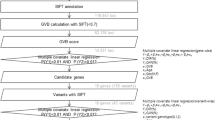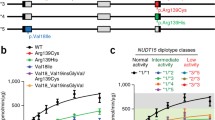Abstract
Purpose
To explore the role of genetic variants of thiopurine methyltransferase (TPMT) and inosine triphosphate pyrophosphatase (ITPA) in 6-mercaptopurine (6-MP)-induced toxicity in Indian children with acute lymphoblastic leukemia (ALL).
Methods
Children with ALL receiving 6-MP in maintenance phase of treatment (n = 90) were enrolled in the study. Bidirectional sequencing of TPMT (whole gene) and ITPA (exon 2, exon 3, and intron 2) was undertaken, and correlation between genotype and 6-MP toxicity was assessed.
Results
Five variations were observed in TPMT, including two exonic variations, TPMT*12 (374 C > T) and TPMT*3C (719A > G), and three intronic, intron 3 (12356 C > T), intron 4 (16638 C > T), and TPMT rs2842949. Two exonic, ITPA exon −2 (94 C → A) and exon 3 of ITPA (138 G > A), and one intronic, ITPA intron 2 (A→C), variations were observed in ITPA. Multifactor dimensionality reduction analysis of all the genetic variants showed independent association of ITPA 94 C→A as well as synergic epistatic interactions, i.e., TPMT*12 × ITPA ex3, ITPA ex2 × TPMT*12 × ITPA ex3, and TPMT*3C × ITPA ex2 × TPMT*12 × ITPA ex3, in determining hematological toxicity. This is further substantiated by a multiple linear regression model, which showed moderate predictability of toxicity with these variants (area under the curve = 0.70, p = 0.004).
Conclusion
Our results suggest that apart from the individual effect of ITPA 94 C→A, epistatic interactions between the variations of TPMT (*3C, *12) and ITPA (ex2, ex3) are associated with the 6-MP toxicity. Testing these variants facilitates tailoring of the 6-MP therapy in children with ALL.




Similar content being viewed by others
References
Krynetski EY, Evans WE (1998) Pharmacogenetics of cancer therapy: getting personal. Am J Hum Genet 63(1):11–16
McLeod HL, Krynetski EY, Relling MV, Evans WE (2000) Genetic polymorphism of thiopurine methyltransferase and its clinical relevance for childhood acute lymphoblastic leukemia. Leukemia 14(4):567–572
Elion GB (1989) The purine path to chemotherapy. Science 244(4900):41–47
von Ahsen N, Oellerich M, Armstrong VW (2008) Characterization of the inosine triphosphatase (ITPA) gene: haplotype structure, haplotype-phenotype correlation and promoter function. Ther Drug Monit 30(1):16–22
Swann PF, Waters TR, Moulton DC, Xu YZ, Zheng Q, Edwards M, Mace R (1996) Role of postreplicative DNA mismatch repair in the cytotoxic action of thioguanine. Science 23(273(5278)):1109–1111
Pazmino PA, Sladek SL, Weinshilboum RM (1980) Thiol S-methylation in uremia: erythrocyte enzyme activities and plasma inhibitors. Clin Pharmacol Ther 28(3):356–367
Weinshilboum RM, Sladek SL (1980) Mercaptopurine pharmacogenetics: monogenic inheritance of erythrocyte thiopurine methyltransferase activity. Am J Hum Genet 32(5):651–662
Lennard L, Van Loon JA, Lilleyman JS, Weinshilboum RM (1987) Thiopurine pharmacogenetics in leukemia: correlation of erythrocyte thiopurine methyltransferase activity and 6-thioguanine nucleotide concentrations. Clin Pharmacol Ther 41(1):18–25
Lilleyman JS, Lennard L (1994) Mercaptopurine metabolism and risk of relapse in childhood lymphoblastic leukaemia. Lancet 14(343 (8907)):1188–1190
Bostrom B, Erdmann G (1993) Cellular pharmacology of 6-mercaptopurine in acute lymphoblastic leukemia. Am J Pediatr Hematol Oncol 15(1):80–86
Dervieux T, Médard Y, Verpillat P, Guigonis V, Duval M, Lescoeur B, Suciu S, Vilmer E, Jacqz-Aigrain E (2001) Possible implication of thiopurine S-methyltransferase in occurrence of infectious episodes during maintenance therapy for childhood lymphoblastic leukemia with mercaptopurine. Leukemia 15(11):1706–1712
Yates CR, Krynetski EY, Loennechen T, Fessing MY, Tai HL, Pui CH, Relling MV, Evans WE (1997) Molecular diagnosis of thiopurine S-methyltransferase deficiency: genetic basis for azathioprine and mercaptopurine intolerance. Ann Intern Med 15(126(8)):608–614
Ameyaw MM, Collie-Duguid ES, Powrie RH, Ofori-Adjei D, McLeod HL (1999) Thiopurine methyltransferase alleles in British and Ghanaian populations. Hum Mol Genet 8(2):367–370
Collie-Duguid ES, Pritchard SC, Powrie RH, Sludden J, Collier DA, Li T, McLeod HL (1999) The frequency and distribution of thiopurine methyltransferase alleles in Caucasian and Asian populations. Pharmacogenetics 9(1):37–42
Kurzawski M, Gawronska-Szklarz B, Drozdzik M (2004) Frequency distribution of thiopurine S-methyltransferase alleles in a Polish population. Ther Drug Monit 26(5):541–545
Gisbert JP, Gomollon F (2008) Thiopurine-induced myelotoxicity in patients with inflammatory bowel disease: a review. Am J Gastroenterol 103(7):1783–1800
McLeod HL, Coulthard S, Thomas AE, Pritchard SC, King DJ, Richards SM, Eden OB, Hall AG, Gibson BE (1999) Analysis of thiopurine methyltransferase variant alleles in childhood acute lymphoblastic leukaemia. Br J Haematol 105(3):696–700
Evans WE, Hon YY, Bomgaars L, Coutre S, Holdsworth M, Janco R, Kalwinsky D, Keller F, Khatib Z, Margolin J, Murray J, Quinn J, Ravindranath Y, Ritchey K, Roberts W, Rogers ZR, Schiff D, Steuber C, Tucci F, Kornegay N, Krynetski EY, Relling MV (2001) Preponderance of thiopurine S-methyltransferase deficiency and heterozygosity among patients intolerant to mercaptopurine or azathioprine. J Clin Oncol 15(19(8)):2293–2301
Stanulla M, Schaeffeler E, Flohr T, Cario G, Schrauder A, Zimmermann M, Welte K, Ludwig WD, Bartram CR, Zanger UM, Eichelbaum M, Schrappe M, Schwab M (2005) Thiopurine methyltransferase (TPMT) genotype and early treatment response to mercaptopurine in childhood acute lymphoblastic leukemia. JAMA 23(293(12)):1485–1489
Sumi S, Marinaki AM, Arenas M, Fairbanks L, Shobowale-Bakre M, Rees DC, Thein S, Ansari A, Sanderson J, De Abreu RA, Simmonds HA, Duley JA (2002) Genetic basis of inosine triphosphate pyrophosphohydrolase deficiency. Hum Genet 111(4–5):360–367
Atanasova S, Shipkova M, Svinarov D, Mladenova A, Genova M, Wieland E, Oellerich M, von Ahsen N (2007) Analysis of ITPA phenotype–genotype correlation in the Bulgarian population revealed a novel gene variant in exon 6. Ther Drug Monit 29(1):6–10
Stocco G, Cheok MH, Crews KR, Dervieux T, French D, Pei D, Yang W, Cheng C, Pui CH, Relling MV, Evans WE (2009) Genetic polymorphism of inosine triphosphate pyrophosphatase is a determinant of mercaptopurine metabolism and toxicity during treatment for acute lymphoblastic leukemia. Clin Pharmacol Ther 85(2):164–172
Advani S, Pai S, Venzon D, Adde M, Kurkure PK, Nair CN, Sirohi B, Banavali SD, Hawaldar R, Kolhatkar BB, Vats T, Magrath I (1999) Acute lymphoblastic leukemia in India: an analysis of prognostic factors using a single treatment regimen. Ann Oncol 10(2):167–176
Relling MV, Hancock ML, Rivera GK, Sandlund JT, Ribeiro RC, Krynetski EY, Pui CH, Evans WE (1999) Mercaptopurine therapy intolerance and heterozygosity at the thiopurine S-methyltransferase gene locus. J Natl Cancer Inst 91(23):2001–2008
Tai HL, Krynetski EY, Yates CR, Loennechen T, Fessing MY, Krynetskaia NF, Evans WE (1996) Thiopurine S-methyltransferase deficiency: two nucleotide transitions define the most prevalent mutant allele associated with loss of catalytic activity in Caucasians. Am J Hum Genet 58(4):694–702
Desire S, Balasubramanian P, Bajel A, George B, Viswabandya A, Mathews V, Srivastava A, Chandy M (2010) Frequency of TPMT alleles in Indian patients with acute lymphatic leukemia and effect on the dose of 6-mercaptopurine. Med Oncol 27(4):1046–1049
Kapoor G, Sinha R, Naithani R, Chandgothia M (2010) Thiopurine S-methyltransferase gene polymorphism and 6-mercaptopurine dose intensity in Indian children with acute lymphoblastic leukemia. Leuk Res 34(8):1023–1026
Murugesan R, Abdul Vahab S, Patra S, Rao R, Rao J, Rai P, Gopinath PM, Satyamoorthy K (2010) Thiopurine S-methyltransferase alleles, TPMT*2,*3B and *3C, and genotype frequencies in an Indian population. Exp Ther Med 1(1):121–127
Kham SK, Tan PL, Tay AH, Heng CK, Yeoh AE, Quah TC (2002) Thiopurine methyltransferase polymorphisms in a multiracial Asian population and children with acute lymphoblastic leukemia. J Pediatr Hematol Oncol 24(5):353–359
Kham SK, Soh CK, Liu TC, Chan YH, Ariffin H, Tan PL, Yeoh AE (2008) Thiopurine S-methyltransferase activity in three major Asian populations: a population-based study in Singapore. Eur J Clin Pharmacol 64(4):373–379
Hamdan-Khalil R, Allorge D, Lo-Guidice JM, Cauffiez C, Chevalier D, Spire C, Houdret N, Libersa C, Lhermitte M, Colombel JF, Gala JL, Broly F (2003) In vitro characterization of four novel non-functional variants of the thiopurine S-methyltransferase. Biochem Biophys Res Commun 3(309(4)):1005–1010
Schaeffeler E, Fischer C, Brockmeier D, Wernet D, Moerike K, Eichelbaum M, Zanger UM, Schwab M (2004) Comprehensive analysis of thiopurine S-methyltransferase phenotype-genotype correlation in a large population of German-Caucasians and identification of novel TPMT variants. Pharmacogenetics 14(7):407–417
Schaeffeler E, Zanger UM, Eichelbaum M, Asante-Poku S, Shin JG, Schwab M (2008) Highly multiplexed genotyping of thiopurine S-methyltransferase variants using MALDI-TOF mass spectrometry. Clin Chem 54(10):1637–1647
Ujiie S, Sasaki T, Mizugaki M, Ishikawa M, Hiratsuka M (2008) Functional characterization of 23 allelic variants of thiopurine S-methyltransferase gene (TPMT*2–*24). Pharmacogenet Genomics 18(10):887–893
Marinaki AM, Ansari A, Duley JA, Arenas M, Sumi S, Lewis CM, Shobowale-Bakre el-M, Escuredo E, Fairbanks LD, Sanderson JD (2004) Adverse drug reactions to azathioprine therapy are associated with polymorphism in the gene encoding inosine triphosphate pyrophosphatase (ITPase). Pharmacogenetics 14(3):181–187
Wan Rosalina WR, Teh LK, Mohamad N, Nasir A, Yusoff R, Baba AA, Salleh MZ (2011). Polymorphism of ITPA 94 C > A and risk of adverse effects among patients with acute lymphoblastic leukaemia treated with 6-mercaptopurine. J Clin Pharm Ther. doi:10.1111/j.1365-2710.2011.01272.x
Adam de Beaumais T, Fakhoury M, Medard Y, Azougagh S, Zhang D, Yakouben K, Jacqz-Aigrain E (2011) Determinants of mercaptopurine toxicity in paediatric acute lymphoblastic leukemia maintenance therapy. Br J Clin Pharmacol 71(4):575–584
Relling MV, Gardner EE, Sandborn WJ, Schmiegelow K, Pui CH, Yee SW, Stein CM, Carrillo M, Evans WE, Klein TE (2011) Clinical Pharmacogenetics Implementation Consortium guidelines for thiopurine methyltransferase genotype and thiopurine dosing. Clin Pharmacol Ther 89(3):387–391
Ansari A, Arenas M, Greenfield SM, Morris D, Lindsay J, Gilshenan K, Smith M, Lewis C, Marinaki A, Duley J, Sanderson J (2008) Prospective evaluation of the pharmacogenetics of azathioprine in the treatment of inflammatory bowel disease. Aliment Pharmacol Ther 28(8):973–983
Acknowledgments
We thank Dr. Senthil. J. Rajappa (Indo-American Cancer Hospital, Hyderabad, India) and Dr. Sudha Sinha (MNJ Cancer Hospital, Hyderabad, India) for providing clinical samples; Mr. Shaik Mohammad Naushad (Nizam’s Institute of Medical Sciences, Hyderabad, India) for statistical analysis and manuscript editing; and Dr. Ch Mohan Rao, Director, CCMB, Hyderabad, India, for providing infrastructural facilities at CCMB. We also thank NATCO Pharma Limited, Hyderabad, India, for supporting the work.
Author information
Authors and Affiliations
Corresponding author
Rights and permissions
About this article
Cite this article
Dorababu, P., Nagesh, N., Linga, V.G. et al. Epistatic interactions between thiopurine methyltransferase (TPMT) and inosine triphosphate pyrophosphatase (ITPA) variations determine 6-mercaptopurine toxicity in Indian children with acute lymphoblastic leukemia. Eur J Clin Pharmacol 68, 379–387 (2012). https://doi.org/10.1007/s00228-011-1133-1
Received:
Accepted:
Published:
Issue Date:
DOI: https://doi.org/10.1007/s00228-011-1133-1




